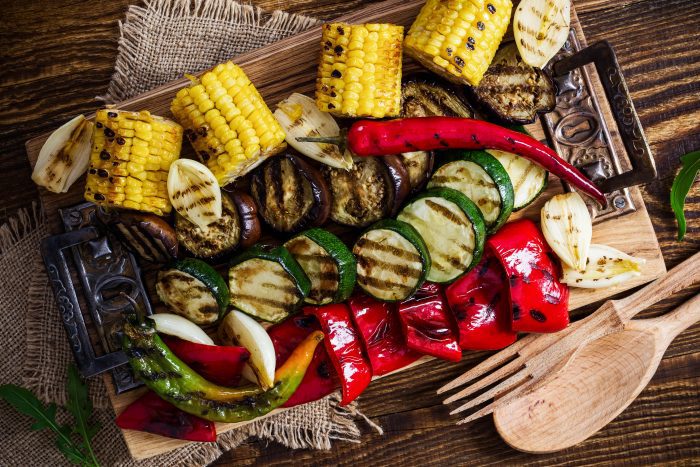Medical Compass: Building a healthier summer barbecue
Increase fruits, vegetables and whole grains and eliminate processed meats
By David Dunaief, M.D.

For many of us, Independence Day launches a long string of summer barbecues. What if you could use these to kick-start your path to better health?
In the past, I have written about the dangers of processed meats in terms of causing chronic diseases, such as cancer, diabetes, heart disease and stroke. These are barbecue and picnic staples. But there are healthier alternatives. If we lean into alternatives, like those found in a Mediterranean-style diet, we can improve our health while enjoying mouth-watering dishes.
The Mediterranean-style diet includes green leafy vegetables, fruit, nuts and seeds, beans and legumes, whole grains and small amounts of fish and olive oil. The options are far from tasteless.
At a memorable family barbecue, we had an array of succulent choices. These included a three-bean salad, mandarin orange salad with mixed greens and a light raspberry vinaigrette, ratatouille with eggplant and zucchini, salmon fillets baked with mustard and slivered almonds, roasted corn on the cob, roasted vegetable shish kebobs, and a large bowl of melons and berries. I am drooling at the memory of this buffet. Let’s look at the scientific evidence that explains why these foods help us.
Cancer prevention
A systematic review initially published in 2016 and updated in 2017 provides a comprehensive look at the results of studies focused on weighing the effects of adherence to a Mediterranean-type diet on cancer risk and progression (1, 2). When the authors pooled and analyzed cohort studies and randomized control trials, they found an inverse relationship between cancer mortality risk and high adherence to the diet. This means that the more compliant participants were, the lower their risk of cancer mortality.
When making the same comparison between high adherence and low adherence from studies of specific cancers, they identified risk reductions for colorectal (17 percent), prostate (four percent), gastric (27 percent), and liver cancers (42 percent) (1). Further study also found high adherence reduced the risks of breast, head and neck, gallbladder, and biliary tract cancer (2).
The authors note that, while it’s improbable that any single component of the diet resulted in these effects, they were able to demonstrate significant inverse correlations between specific food groups and overall cancer risk. For example, the higher the regular consumption of fruits, vegetables, and whole grains, the lower the risk. All three of these fit right in at an outdoor feast!
Looking more closely at specific cancers, another study found that increased consumption of fruits and vegetables may help prevent pancreatic cancer. This is critical, since by the time there are symptoms, often the cancer has spread to other organs (3). In a case control (epidemiological observational) study, cooked vegetables showed a 43 percent reduction and non-citrus fruits showed an even more impressive 59 percent reduction in risk of pancreatic cancer (4). Interestingly, cooked vegetables, not just raw ones, had a substantial effect.
Diabetes treatment and prevention
Fish might play an important role in reducing the risk of diabetes. In a large prospective study that followed Japanese men for five years, those in the highest quartile of fish and seafood intake had a substantial decrease in risk of type 2 diabetes (5). Smaller fish, such as mackerel and sardines, had a slightly greater effect than large fish and seafood. Therefore, there is nothing wrong with some grilled fish on the “barbie” to help protect you from developing diabetes.
Nuts are beneficial in the treatment of diabetes. In a randomized clinical trial, mixed nuts led to a substantial reduction of hemoglobin A1C, a very important biomarker for sugar levels for the previous three months (6). As an added benefit, there was also a significant reduction in LDL, bad cholesterol, which reduced the risk of cardiovascular disease.
The nuts used in the study were raw almonds, pistachios, pecans, peanuts, cashews, hazelnuts, walnuts and macadamias. How easy is it to grab a small handful of unsalted raw nuts, about 2 ounces, on a daily basis to help treat diabetes?
Stroke prevention
Olive oil appears to have a substantial effect in preventing strokes. The Three City study showed that olive oil may have a protective effect against stroke. There was a 41 percent reduction in stroke events in those who used olive oil (7). Study participants, who were followed for a mean of 5.2 years, did not have a history of stroke at the start of the trial.
Though these are promising results, I caution you to use no more than one tablespoon of olive oil per day, since it’s calorically dense.
It is not difficult to substitute the beneficial Mediterranean-style diet for processed meats, or at least add them to the selection. This plant-based diet can help you prevent many chronic diseases. So, this Independence Day and beyond, plan to include some delicious, healthy choices.
References:
(1) Curr Nutr Rep. 2016; 5: 9–17. (2) Nutrients. 2017 Oct; 9(10): 1063. (3) Nature. 2010;467:1114-1117. (4) Cancer Causes Control. 2010;21:493-500. (5) Am J Clin Nutr. 2011 Sep;94(3):884-891. (6) Diabetes Care. 2011 Aug;34(8):1706-11. (7) Neurology. 2011 Aug 2;77(5):418-25.
Dr. David Dunaief is a speaker, author and local lifestyle medicine physician focusing on the integration of medicine, nutrition, fitness and stress management. For further information, visit www.medicalcompassmd.com or consult your personal physician.







